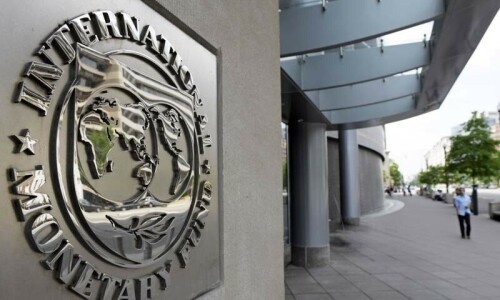ISLAMABAD: At the conclusion of technical talks with the International Monetary Fund (IMF), Pakistan has proposed no additional taxation measures, opting instead to recover additional revenues through legal and administrative means.
However, the government presented a contradictory stance on electricity pricing, seeking both relief on general sales tax (GST) on electricity and approval for an additional financial surcharge on power bills.
Formal policy-level talks are set to begin on Monday (March 10), where an IMF staff mission led by Nathan Porter will formally speak its mind on the revenue aspect. Sources said the Fund’s staff opposed outright the authorities’ proposal to abolish or reduce general sales tax on electricity to reduce costs.
Conversely, however, the government’s side also proposed about Rs2.83 per unit additional financial surcharge on electricity for the next five years to finance about Rs1.2 trillion loan it has arranged to clear a part of power sector circular debt besides other book adjustments. This arrangement was welcomed by the IMF.
Govt promises no new taxes, but IMF seeks stronger compliance
This means that instead of repeated promises to reduce electricity rates, the government would actually be adding a financing cost surcharge to the honest consumers to cover the government’s and power companies’ inefficiencies. The government is already charging about Rs1.47 per unit financing cost surcharge for loans borrowed in the past for circular debt adjustments.
The sources said the IMF also rejected a government request to extend the winter tariff package, which offers cheaper electricity rates to industrial and commercial consumers for incremental consumption.
The government also briefed the IMF on plans to slash solar net-metering tariffs from Rs26 per unit to Rs10, raising concerns about the impact on consumers shifting to off-grid solutions. While officials did not anticipate an immediate challenge, they assured the IMF that they would respond proactively if the shift accelerated.
Revenue shortfall
Sources said the authorities shared an alternate plan to bridge the anticipated revenue shortfall of about Rs600 billion for the year instead of additional taxation measures.
While some fiscal space would be created through expenditure control, particularly in the development programme, the tax authorities promised robust recoveries through legal cases that were at advanced stages of adjudication besides strong enforcement measures in retail, real estate and some other sectors on top of compliance risk management.
Sources said the authorities were also touching base with the IMF over easing taxation on the salaried class going forward, but this could be conditional on better tax compliance in other untaxed areas and non-compliant areas like the black tobacco market.
Therefore, the IMF was more interested in effective on-ground measures, including track-and-trace systems and FBR’s transformation plan.
Officials claim that Pakistan had generally met most of its end-December 2024 targets, albeit some of them with delays. Given the timing of the first biannual review, forward-looking discussions would also take a sizable part of policy talks for next year’s budget, due in the first week of June.
The policy-level talks would also cover governance reforms, including the creation of a new portal for uploading tax returns and asset declarations of government officers. The IMF staff mission is also engaging separately with the provincial governments and had an initial round with Khyber Pakhtunkhwa.
These engagements are particularly crucial with regard to preparations for the effective implementation of agricultural income tax with effect from July 1, 2025, and other measures agreed between the federal and provincial governments over the national fiscal pact, including provincial cash surpluses and financing of devolved subjects by the federating units.
Other provinces would also engage with the visiting Fund team on the sidelines of policy-level talks to be finally wrapped up with Finance Minister Muhammad Aurangzeb and State Bank Governor Jameel Ahmad by next Friday (March 14).
A successful conclusion of the current IMF review is expected to unlock the second tranche of over $1bn under Pakistan’s $7bn Extended Fund Facility (EFF).
The 37-month programme, finalised in July 2024 and formally signed in September, includes seven equal tranches disbursed every six months, contingent upon full compliance with IMF conditions.
The first tranche of $1.1bn was received upfront.
Published in Dawn, March 8th, 2025




































